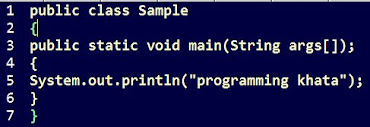Introduction of java
1. What Is Java?
· Java is a high-level, third-generation programming language .created in 1995 by “Jamesh Gosling”.
2. What is the Full form of OOPs?
·
OOPs:- OOPs is a Programming Paradigm | Methodology. Paradigm can also be termed as a method to
solve some problem or do some task. A programming paradigm is a language or also we
can say it is a method to solve a problem using tools and techniques that are
available.
·
Programming
Paradigm:-
i.
Object-Oriented Paradigm
ii.
Procedural
Paradigm
iii.
Functional
Paradigm
iv.
Logical
Paradigm
v.
Stractural
Paradigm
v OPPs Main Pillers:-
A.
Class
B. Object
And Method
C. Inheritance
D. Polymorphism.
E. Abstraction
F. Encapsulation
3. Who are the purely Object-Oriented
Programming Language?
·
[
SmallTalk ] is a pure object-oriented programming language truly.
v
JDK:- [JAVA DEVELOPMENT KIT ] java
development kit contains tools needed to develop the java program.
This tools could be compailer [
javac (classname).exe] application
luncher [javac .exe] etc..
v JRE:- [ JAVA RUNTIME ENVIRMONENT] java runtime environment are contains JVM [java package class] (java library
v JVM:-
[java virtual machine] JVM is a platform-dependent JVM that provides a platform-independent executing code
JVM
interprets the byte code into machine code depending upon the underline operation system and hardware combination.
4. What is different between compiler
& iterative?
|
Compiler |
iterative |
|
|
The compiler is fast. |
Iterative is slow |
|
5. What is data type?
6. What is a variable?
· It is a container that can contain any value.
· EXAMPLE:-
7. Java program can be possible without the main method?
· It is possible to compile a java program without a main method, provided that class is used as a superclass. However, the program will execute only when there is a valid main method in the classes.
8. Why is java architecture-neutral?
· To enable a Java application to execute anywhere on the network. The compiler generators an architecture-neutral object file format –the compiled code is executable on many processors given the presence of the java runtime system .this is useful not only for networks but also for single system software distribution.
9. What are the order of precedence and associativity?
· Order of precedence the order in which operators are evaluated in expressions. associativity determines whether an expression is evaluated left-right-left.
10. What is JVM? Why java is called [platform independent language]?
Or
11. Why is java known as a platform-neutral language?
· Part1:- java virtual machine (JVM) is the heart of java programming language. JVM is responsible for converting byte code into machine-readable code. JVM is not platform-independent, that’s why you have different JVM for the different operating systems. we can customize JVM with java options .such as allocating minimum and maximum memory to JVM .it is called virtual because it provides an interface that does not depend on the underlying operating system.
· Part 2:- java is platform-independent because code is compiled into an intermediate language .called ”bytecode”, which is then compiled into native machine code on the system that supports Java can run any java application.
12. state why
public, static, void, and String[] args
is used in “public static void main(String args[])?
·
Public:- is an access modifier, which defines who
can access this method public means that
this method will be accessible by any class (if other classes can
access this class)
·
Static:-
is a keyword that identifiers
the class-related things. This means the given methods or variable is not
instance-related but class-related. it can be accessed without creating an instance of a class.
·
Void:- is used to define the return type of the
method. It defines what the method can return void means the method will not
return any value.
·
Main:- is the name of the method this method name
is searched by JVM as a string point for an application with a particular
signature only.
·
(String args[]):- is the parameter of the main method.
Ø
Type
of java variable and its value:-
I.
Int:- 1
II.
Float:-
1.1f
III.
Double:--
11.11D
IV.
Long:-- 111111L
V.
Char:- ‘ R ’
VI.
String:-
“programmingKhata”
v
Sample
program of java:-
Note: -open cmd (commend
protomer)on your computer and compile
and run then initialize
Output:- javac Sample.java
Java Sample
-Programming khata-
Output:- javac Sample.java
Java Sample
-(the sum vslue
of xand y:= 15)-









0 Comments